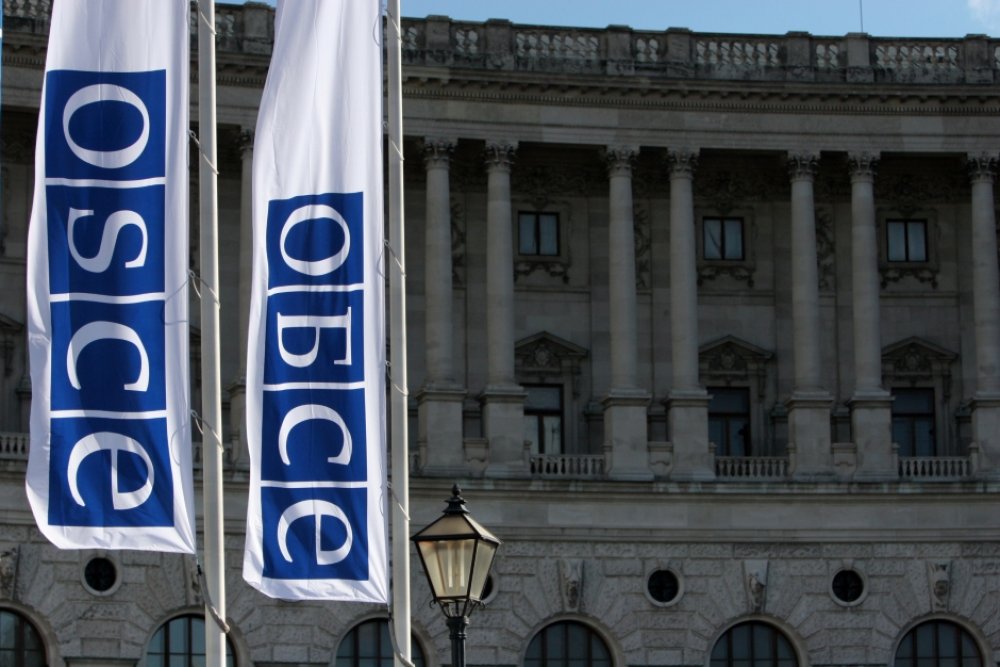OSCE/Maria Kuchma

Italian OSCE Chairmanship: Implementation of OSCE Human Rights Commitments
In 2018 Italy took over the Chairmanship of the OSCE and, on a voluntary basis and following the example of the Swiss, the Serbian, the German and the Austrian Chairmanships it reviewed the implementation status of existing commitments in the human dimension. The practice of the State reporting system has become crucial to assess the credibility of the country chairing the OSCE, vis-à-vis the respect of the fundamental values of the Helsinki Final Act and other commitments. Through its Ministry of Foreign Affairs and International Cooperation, Italy requested the Sant’Anna School of Advanced Studies (Scuola Superiore Sant’Anna) to draft, under my supervision, the independent report on the implementation of selected OSCE human rights (human dimension) commitments.
In the preparation of the report, great emphasis was placed on the importance of using an ad hocmethodology in order to engage from the outset all the relevant stakeholders. The preparation of the report was organized in three main phases. The first phase included the identification of fifteen possible themes, which were submitted to more than 200 relevant Italian stakeholders, identified among civil society actors, NGOs, academia and governmental institutions. Answering specific questions, thanks to an online survey, these actors were able to give their preferences for the themes that they considered more relevant and to be analysed in the report. As a result of the survey, the stakeholders which demonstrated an active engagement, open criticism and a clear interest in the exercise, identified five main areas: migration, refugees and asylum seekers; violence against women; trafficking in human beings; women, peace and security; racism, xenophobia and anti-Semitism.
The second phase consisted in the drafting of the chapters on the above-mentioned themes,an activity that required a certain amount of desk research in order to collect and revise the relevant background material. Desk research included the systematic, qualitative examination of available literature and secondary sources of information (including web sources) in the context of the topics of the report. It consisted of identifying, locating, reviewing, and extracting relevant information and data from legal documents, studies, reports, previous evaluations, policy documents, scientific publications, proceedings from conferences and expert hearings and the like. Interviews with stakeholders and surveys to relevant sources were also used as a research tool. A dedicated webpage has been created to foster avenues for establishing a transparent process that informed about the phases of its preparation, the measures enacted for ensuring consultations with relevant stakeholders and to constitute a hub for gathering feedback, comments, and observations through a participatory process. Finally, during the third phase, the stakeholders were required to submit comments, critiques and feedbacks to the first draft of the chapters, through an online platform. These comments were duly taken into consideration by the authors who accordingly amended and/or integrated their initial draft. The research work revolved around two main pillars: (a) the temporal scope of the research covered the last 5 years and (b) the objective of the report was to critically evaluate the implementation status of OSCE commitments in selected thematic areas in Italy.
Without delving into the specific findings of the individual Chapters, overall, what emerges from the report is a satisfactory level of conformity of the legislation currently in force in Italy with the OSCE commitments and the main international norms, customary and treaty based, on the above-mentioned themes; on the other hand, what is lacking is the full implementation of these laws at the local and national level.
In the field of migration relevant shortcomings include, for example, the absence of a National Plan on Migration, which must be adopted every three years, and the lack of a systematic long-term strategy to migration. In relation to women, peace and security it is worth stressing that important results have been achieved in the areas of participation, protection, relief and recovery. The number of female personnel in national police, armed forces and peace operations has increased throughout the recent years, however, the number of female uniformed personnel remains critically low, and particularly so in senior management position. With regard to human trafficking, Italy has a legislative and institutional framework in place that fully meets the requirements included in the selected OSCE commitments relevant to this field, even if some shortcomings remain in its implementation. For instance a more holistic approach to the issue is recommended when it comes to facilitating the access of NGOs’ staff to reception centres for irregular migrants, identification and expulsion centres, prisons and other detention centres. In addition, two crucial issues are represented by the need to enhancing the investigative tools to intercept the cash flow of international criminal organizations and to strengthening the already existing networks that uphold the respect of labour laws and human rights in agricultural labour contexts.
When it comes to violence against women, Italy has ratified both the CEDAW and the Istanbul Conventions and updated its legislation to comply with the existing international obligations. However, it shall be observed that the current legislation is particularly concerned with the criminal repression of acts of violence against women, whereas other important aspects, such as prevention and protection, are not enshrined in the existing legal framework, but rather in policy documents, i.e. the National Action Plans to lay down a progressively comprehensive national policy on violence against women.
The inquiry concerning the issues connected to xenophobia and anti-Semitism has showed that the Italian legislative framework is fully in line with the OSCE standards and commitments, laid down in the 1990 Copenhagen Document and reiterated afterwards, that entail the unequivocal condemnation of totalitarianism, racial and ethnic hatred, anti-Semitism, xenophobia and discrimination against anyone as well as persecution on religious and ideological grounds.
Consistently with the obligations stemming from the international legal framework, Italy has adopted a National Plan on Action against Racism, Xenophobia and Related Intolerance (2013 and 2015). However, the plans still have to be fully implemented and many issues still need to be duly addressed. In particular, as stressed also by the Committee on the Elimination of Racial Discrimination in 2017, Roma, Sinti and Caminanti communities in Italy still experience persistent and entrenched discrimination, especially through the practices of forced evictions and segregation in campsor housing areas with substandard accommodation.
Moreover, while Italy regularly reports hate crimes data to ODIHR, it would be important to include in the report also the number of persons prosecuted as well as information on sentenced hate crimes. Finally, amongst the most timely and urgent issue it is worth mentioning also the fight against hate speech and hate crimes on the Internet, which requires increasing efforts in order to neutralize the potential threat to freedom of expression and information in the long run.
In conclusion, the assessment carried out has highlighted some weaknesses in the Italian framework that can be overcome with a more holistic approach that calls for the adoption of long-term strategies on several issues and the correct implementation of what is already embedded in the Italian legislative and institutional system.
The present report has taken into account the lessons learned from previous independent assessment reports developed by past OSCE Chairmanships and it has to be welcomed as a tool to further strengthen the capacity of Italy to further improve the implementation of the OSCE commitments in the near future.
The practice of independent evaluation proves to be of great importance as it contributes to a broader discussion at the national and international level, involving relevant national stakeholders as well as the civil society and stimulating a more accurate and informed implementation of the OSCE principles and commitments. After 5 years the time is ripe to elaborate new ideas on the independent reports’ follow up in order to make the entire exercise more credible.
In this regard a number of suggestions can be made, including for example the possibility to attribute to ODIHR the role of depositary of the reports and, eventually, to examine them and to monitor their implementation. Another possibility that deserves to be further explored would be to ask States to provide, within the framework of the Universal Periodic Review (UPR), info on the outcomes of the reports and on the activities undertaken to implement the recommendations contained therein. Furthermore, the emphasis placed on engaging as much as possible all the relevant stakeholders, including civil society organizations, should not be limited to the preparation of the report, but must carry on also in the subsequent phases. In particular, it is important to officially present the findings of the report to the stakeholders who participated in the drafting process and provide them with the opportunity to publicly and jointly comment on the implementation of the recommendations made.
Moreover, since the main problems connected with the effective enforcement of the existing legal framework emerge at the local level, it would be crucial to disseminate the findings of the report across the Italian Regions, Provinces, Cities and local authorities. In this author’s view this would significantly contribute to increase the relevance and the impact of the independent reports.
Prof. Andrea de Guttry is Full Professor of Public International Law at the Scuola Superiore Sant’Anna, where he also serves as Deputy Rector, Director of the DIRPOLIS Institute (Institute of Law, Politics and Development) and Director of the International Training Programme for Conflict Management.



Comments
* Your email address will not be published